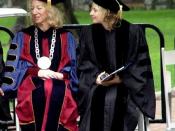Jodie and Mary are twins joined at their lower abdomens. Jodie is an alert baby, with functioning heart and lungs. Mary has no effective heart or lung function and lives purely because of her attachment to Jodie. According to commonly accepted medical evidence, JodieÃÂs life would be virtually as long as, and would have the quality of, that of any ordinary child if separated from Mary. It is clear that if the twins were separated then Mary would die. Equally, it is clear that if the twins were not separated then eventually JodieÃÂs heart and lungs will fail and both twins will die. The parents are resolutely opposed to any surgery for the twins as they feel it would be morally wrong to intentionally cause the death of one of their twins.
The doctors have two choices. They can apply to the courts to undergo the operation against the parentsÃÂ wishes, or they can respect the parentsÃÂ wishes and not operate.
A scenario like this raises a number of issues, whether it be the individuals involved, the laws or the challenges involved in making the ÃÂrightÃÂ decision. In addition many ethical questions usually arise in trying to understand or explain the situation. For example, will the outcome of the surgery be successful? Is sacrificing one twin to save the other justified?In this rare case of conjoined twins, the decision on separation presents a conflict of interest between the parentsÃÂ values and the medical professionalsÃÂ expertise or duty. The outcome also presents a ray of possibilities. Firstly if surgery is carried out, there are a number of potential results e.g. a successful separation, the death of the weaker twin, the separation resulting in the death of both twins or a risk of long-term complications during and after surgery.


